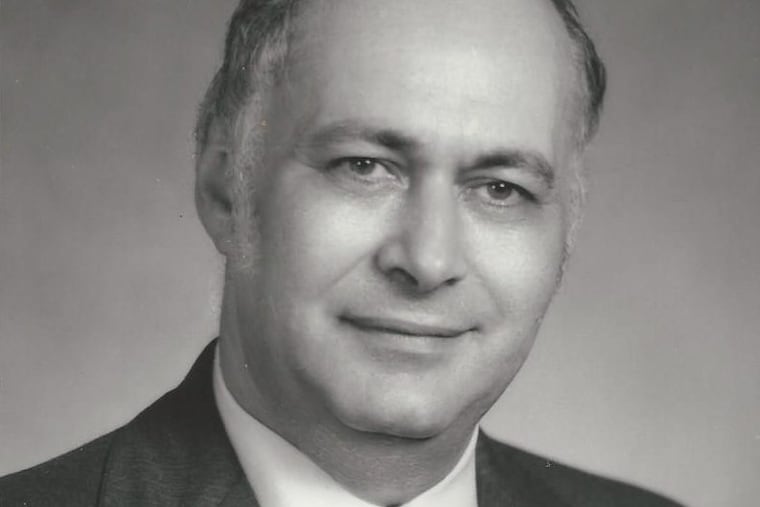David N. Savitt, former trial lawyer, Pa. state legislator, and Common Pleas Court judge
Judge Savitt rose from humble circumstances. His father was an upholsterer. "We were poor," he said in an interview. "I didn't know we were poor."

David N. Savitt, 90, of Society Hill, a former trial lawyer, state legislator, and administrative judge of the Philadelphia Common Pleas Court, died Tuesday, Oct. 23, of congestive heart failure at Penn Hospice at Rittenhouse.
Judge Savitt began serving on the Common Pleas bench in 1974 and attained senior judge status in 1998 before retiring in 2008. During that time, he presided over 800 homicide cases, according to a legal profile.
From 1976 until 1983, he served as the court's administrator, overseeing its daily operations.
Before taking the bench, he was a Democratic state representative from the 198th District, which includes East Falls and parts of North Philadelphia. He served from 1968 to 1973.
The son of an upholsterer, Judge Savitt made no bones about his humble beginnings. In November 2003, he told an interviewer for the Senior Judge Oral History Project that he was born in Philadelphia but reared in Atlantic City in very modest circumstances.
"We were poor," he said. "I didn't know we were poor. When I was outside and fell, I didn't look to see how I was, I just wanted to make sure my pants weren't torn."
He graduated from Rutgers University in 1950 and law school at the University of Pennsylvania three years later. At first, he was very intimidated by his law-school classmates.
"The first year, I was scared to death," he said in the oral history. "I thought everybody knew more than me. A lot of these guys, their fathers were lawyers. My father was an upholsterer."
After law school, he served two years in the Army. "I hated every minute of it, but learned how to take orders, I learned respect for authority, and made some friends I kept all my life," he said.
Before launching a career as a trial lawyer in 1953, he held jobs as a cab driver and flower shop clerk, and sold salt water taffy on Atlantic City's Boardwalk.
"Growing up, I had every job known to man," he said, "and that, too, was a wonderful experience."
Judge Savitt joined his friend John Patrick Walsh, a criminal lawyer, in the Philadelphia law firm of Walsh & Savitt. While there, he made important contacts in the city's Democratic Party, especially as leader of the 38th Ward Democratic Committee.
Former Philadelphia District Attorney Lynne M. Abraham was a young prosecutor when Judge Savitt was starting out as a defense lawyer.
"He was a terrific guy, a good lawyer," she said. "It was two opposing lawyers, fighting for their position. He put up a spirited defense. He was well-prepared. He was respectful to the tribunal and respectful to me. He just wanted to represent his client well."
During his legislative career, Judge Savitt supported no-fault divorce, a graduated state income tax, and elimination of Sunday blue laws, which made it illegal to do business on Sunday in most of Pennsylvania, while Philadelphia and New Jersey allowed such commerce.
"It is unfair that merchants in Philadelphia can operate with immunity while merchants in neighboring counties cannot," he said in a Jan. 14, 1971, Inquirer story.
"Don't get me wrong, I'm not against the Ten Commandments," he said. "I don't think the Lord on Mount Sinai meant that we should be able to go to the movies, watch television, enjoy football games, and yet be unable to buy a kid a pair of shoes on Sunday."
The blue laws were found to be unconstitutional by the state Supreme Court and repealed in 1978.
Two years after he took the bench in 1974, he was hand-picked to decide a case involving a move to recall Mayor Frank L. Rizzo.
The Americans for Democratic Action, the Citizens Committee to Recall Rizzo, and recall movement leader Shelly Yanoff pushed for a recall referendum, saying Rizzo was moving for an excessive wage-tax increase, was biased against African Americans, and was not a responsible steward for the city.
In a 61-page ruling on Sept. 16, 1976, Judge Savitt wrote that the recall petition was legally drawn with the required number of signatures, and that the recall process could move forward. With that, the "yes‐no" question on Rizzo's recall was to be placed on the Nov. 2 election ballot. But lawyers for the mayor appealed the ruling to the state Supreme Court, and it was overturned on Oct. 1, 1976.
As a jurist, Judge Savitt was "a dream," Abraham said. "He was there to make sure the prosecution did its job and the defense did its job. He was bright and self-effacing in wit."
When not in court, he loved to go to the racetrack and watch the horses. He was a big Phillies fan.
Judge Savitt is survived by Judith Cooper Savitt, whom he married in 1958; sons James and William; six grandchildren; six nieces and nephews; and a sister.
A graveside service will be held at 2 p.m. Thursday, Oct. 25, at Roosevelt Memorial Park, 2701 Old Lincoln Highway, Trevose.